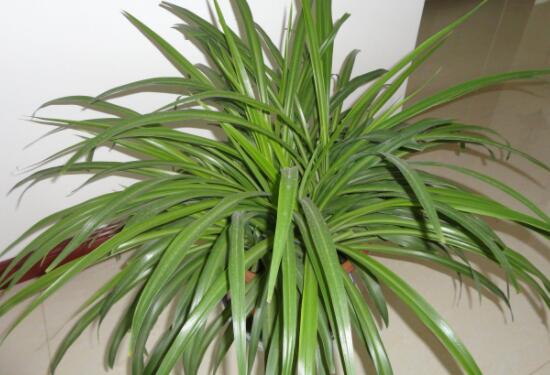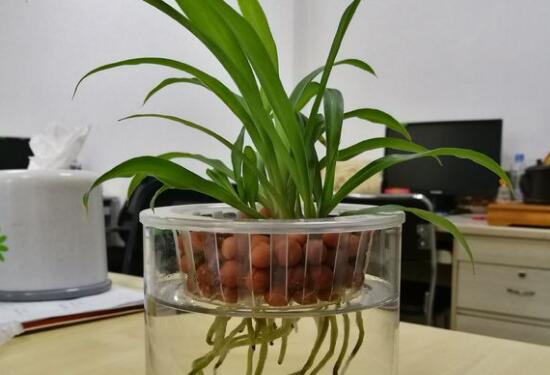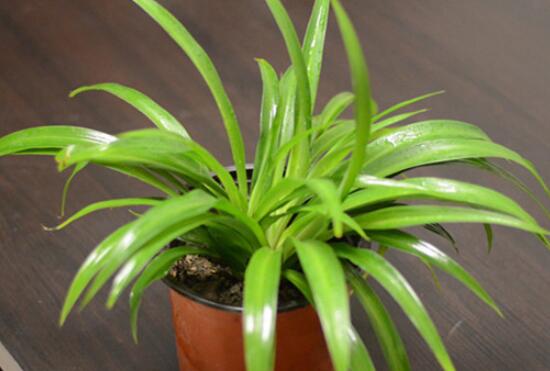How to do if the leaves of green leaves can't stand up, supplement light and moisture/timely pruning
Green leaf orchid, the best in the orchid, it can not only absorb formaldehyde, but also has a very high ornamental. And to the hanging orchid, everyone's impression should be its drooping leaves, but the green leaf hanging orchid is a little different, that is, its leaves are vertical! However, there are flower friends of the green leaf hanging orchid leaves can not stand up, what is the matter? Today, the editor is here to solve this problem for everyone.
First, the green leaf hanging orchid leaves can not stand up, look for the cause

It is normal to say that the leaves of Cymbidium are drooping, but this is not the case, because its leaves are erect. But because there are a lot of rookies, they don't know the breeding method of green leaf orchid at all. as a result, the leaves droop and the ornamental quality decreases. In this regard, the editor found four reasons, and let's move on to the details.
Second, the green leaf hanging orchid leaves can not stand up, the reason and the solution
1. Excessive nitrogen fertilizer
For ordinary flower friends, if you fertilize the green-leaf orchid, the main choice is nitrogen fertilizer, because the nitrogen fertilizer makes more, which is conducive to the plant's luxuriant branches and leaves, and looks particularly pleasing to the eye. But if too much nitrogen fertilizer is applied, the leaves of the plant are too exuberant and it is easy to droop.
Solution: if the leaves of Cymbidium can not stand up caused by the application of nitrogen fertilizer, we should reduce the amount of nitrogen fertilizer and apply 0.2% potassium dihydrogen phosphate (nitrogen and potassium fertilizer) once a week to achieve the purpose of sturdiness and make the leaves stand up again.
2. Lack of light
When it comes to the reason why the leaves of Cymbidium can not stand up, light is a point that can not be ignored. It is understood that the green leaf hanging orchid likes the semi-overcast environment, but this does not mean that it does not need light. And once the light is insufficient, the photosynthesis of the leaves decreases, and the end result is that the leaves will slowly droop.
Solution: it's simple, just add light. Put the green leaf orchid close to the window and balcony and let it be exposed to astigmatism, but do not let the direct sunlight in summer, easy to scorch the leaves. Careful care for a period of time, I believe that the leaves will recover.
3. Too little watering
The green-leaf orchid likes the humid environment and needs sufficient water in the process of growth. once the water is irrigated less, the basin soil is too dry, and the leaves are easy to droop if the water is not absorbed.
Solution: replenish water, but not too much watering, just keep the basin soil moist.
4. Untimely pruning
If properly maintained, the green leaf hanging orchid looks very similar, in this case, it is difficult for the leaves to stand up.
Solution: prune in time, cut off all the old leaves, scorched leaves and dead leaves. Be sure to prune regularly so that the leaves are always fresh and there are more upright leaves. It is worth mentioning that green-leaf orchids are very resistant to pruning, so flower friends can rest assured that they can prune them.
Generally speaking, there are four reasons why the leaves of Cymbidium can not stand up: too much fertilization, insufficient light, too little watering, and untimely pruning, so we must pay attention to these four points in the process of maintenance. I believe that as long as you do it in place, the green leaf hanging orchid will restore its fresh and elegant image, and then we can appreciate its beauty again!
How to raise the green leaf orchid, the culture method and matters needing attention / like water of the green leaf orchid
Green leaf hanging orchid, a very beautiful foliage plant, has blue-shaped leaves, bright green leaves, and a super drug addict function, so it is deeply loved by flower friends. In life, many families will choose to raise a pot of green leaf orchids, then how to raise green leaf orchids? The following are the breeding methods and matters needing attention of the green leaf orchid arranged by the editor, which are very detailed. Friends who want to raise them must have a look at them.
First, how to raise green leaf orchids to meet their habits
The green leaf hanging orchid likes the warm and humid environment, at the same time, it likes semi-shade and avoids strong light. When breeding indoors, in addition to watering frequently to keep the basin soil moist, it should also avoid basking in the sun and take good measures to keep warm in winter. As for the soil, it is required to be loose and fertile, breathable and permeable. Therefore, how to raise the green leaf orchid is very simple and can satisfy its growth habits. Let's move on to the specific requirements.
2. Culture methods and matters needing attention of green leaf orchid
1. Basin soil
How to raise the green leaf orchid indoors, the pot soil should be re-selected first. The green-leaf orchid potted plant purchased by the florist or online can ensure the normal growth of the plant, but the flowerpot and soil are very cheap. if you want the green-leaf orchid to grow well, choose the soil you like and the suitable flowerpot.
Flowerpots: you can use clay flowerpots, plastic pots, porcelain pots, pottery pots, and of course try to choose beautiful ones. As for flowerpots, we usually choose those with a diameter of 14-18 cm.
Soil: according to the growth habits of Cymbidium, it likes loose, fertile, well-drained sand. The editor recommends that people use: 3 parts of rotten leaf soil, 3 parts of garden soil, 3 parts of sandy soil, 1 part of rotten cake fertilizer, and mixed culture soil.
2. Lighting
As a kind of foliage plant, in the method of raising green leaf orchid, the importance of light is self-evident. Green leaf hanging orchids like semi-shade, afraid of hot sun exposure, especially in the northern region, spring, summer and autumn need to cover 50% to 70% of the sun, winter can not cover the light, need plenty of sunlight.
Note: the green leaf hanging orchid is not tolerant to the hot sun. If the sun is strong, its leaves will be burned. Therefore, when breeding indoors, it should be placed in a place with more than 50% shade.
3. Temperature
How to raise the green leaf orchid, the appropriate temperature adjustment is also very necessary. Green leaf Cymbidium likes to be warm. When the room temperature is 20 ℃, the stems and leaves grow rapidly, and the winter temperature is not lower than 5 ℃.
Note: Cymbidium is not cold-resistant, it can survive the winter safely at room temperature above 5 ℃, but if the ambient temperature is lower than 5 ℃, the plant will suffer frost damage. So in winter, it is necessary to prevent the damage caused by too low temperature to plants.
4. Watering
Water is the source of life, so watering is an essential part of the breeding method of green leaf orchid. The green leaf hanging orchid likes the humid environment and needs to keep the basin soil moist during its growth. It should be well watered in summer, and spray water on the branches and leaves every evening to keep the air moist. Move into the sunny place indoors in early October and water it every 5-7 days.
Note: there is a large amount of water in the fleshy root of Cymbidium, so it has strong ability to resist drought. Therefore, it can not be watered too much, in order to prevent stagnant water in the basin, resulting in the emergence of rotten roots.
5. Fertilization
After watering, let's talk about fertilization, it is also very important in the growth process of green leaf orchid. In the spring and autumn growing season, rarefied liquid fertilizer is applied every 15 days or so, and topdressing should be stopped during high temperature in summer and dormancy in winter.
Note: when fertilizing the green leaf orchid, remember not to splash the fertilizer on the leaves; in summer and winter, if the temperature difference is more than 10 ℃, you can apply fertilizer once a month.
6. Pruning and changing pots
The green leaf hanging orchid will grow up gradually with the increase of growth age. in order to maintain good plant shape and beauty, the old leaves at the base should be often trimmed; and according to the size of the plant root, the pot should be changed every year from March to April. When changing the basin, the excess fleshy root is slightly trimmed, planted in a new pot and placed in a shaded place, and then normal maintenance and ornamental are carried out after the plant resumes growth.
7. Diseases and insect pests
Although the green-leaf orchid is not easy to suffer from diseases and insect pests, the stagnant water in the basin soil and poor ventilation may also lead to root rot and root rot; in addition, it is easy to be harmed by scale insects when the plant cluster is dense and poorly ventilated. Prevention should give priority to prevention. Once the occurrence of diseases and insect pests, should be immediately spray control, which can refer to the green leaf Cymbidium pest control.
How to raise green leaf orchid?
The green leaf orchid is one of the common family foliage flowers that people like. It is a perennial evergreen herb of the Liliaceae. It has bright green leaves, leaf shape such as orchid, fresh and elegant, and has a very strong function of absorbing poisonous gases. In general, the poisonous gas in the air can be completely absorbed. Let's take a look at how to raise the green leaf orchid together.
Growth habits of Cymbidium chinense
The green leaf orchid prefers warm, humid, semi-shady environment, strong adaptability, drought tolerance, not very cold tolerance, no choice of soil, and grows better in well-drained, loose and fertile sandy soil. Light requirements are not strict, generally suitable for growth in medium light conditions, but also resistant to weak light. The suitable temperature for growth was 15: 25 ℃, the overwintering temperature was 5 ℃, and the growth stopped above 30 ℃. The plants could grow normally at room temperature above 12 ℃ in winter. If the temperature was too low, the plants would grow slowly or dormant, and chilling injury would occur if the temperature was lower than 5 ℃.
The Propagation method of Cymbidium
1. Cutting: it can be carried out at any time from spring to autumn, cut the clustered stems and leaves on the stolon and plant it in a flowerpot directly, pour through water and keep it in the shade, be careful not to bury it too deep, otherwise it is easy to break your heart.
2. Ramet: when the plant is divided, the plant can be pulled out of the pot, the old soil and rotten root can be removed, and the old root can be cut open, so that there are three stems on the divided plant, and then transplanted and cultured respectively.
3. Sowing: it is carried out in March every year, because the seed particles are not large, the covering soil above the seeds should not be thick, generally 0.5 cm. Under the condition of 15 ℃, it can sprout for about 2 weeks, and then transplant and culture after the seedlings take shape.
How to raise green leaf orchid?
1. Light: the green leaf hanging orchid likes the semi-shady environment and is very sensitive to light. the leaves will wither and yellow in summer and autumn when the sun shines directly, even the whole plant will die. In winter, because the sun is not strong, it can make the green leaf orchid accept some direct sunlight properly.
2. Temperature: green leaf Cymbidium prefers warm and humid climate, can not tolerate severe cold and heat, the optimum growth temperature is 15: 25 ℃, and the room temperature in winter should not be lower than 5 ℃. Avoid strong light in high temperature, but see more sunshine in low temperature and cold.
3. Watering: the green leaf hanging orchid likes water, has strong drought resistance, and needs more water during the peak growth period from March to September, so it is necessary to water and spray frequently to keep the basin soil completely moist. In the winter dormant period, you can wait until the surface of the basin soil is about 1 cm deep dry before watering.
4. Fertilization: the green-leaf orchid is a more fertilizer-tolerant plant, the scorched head is easy to grow old when the fertilizer and water is insufficient, the leaves turn yellow and lose the ornamental value. If the green-leaf orchid that has begun to grow plantlets is applied nitrogen fertilizer once a half month, it is OK not to apply nitrogen fertilizer to the green-leaf orchid that grows well.
5. Soil: green leaf hanging orchid should use light and fertile sandy loam, which requires that the soil contains humus and strong permeability. Pot cultivation can use the same amount of humus or peat soil, garden soil and river sand as substrate.
6. change the basin: the green leaf hanging orchid should change the basin once a year in March. If the basin is deeper and the base fertilizer is sufficient, the basin can be changed once every two years. When turning the basin, the plant will be knocked out of the basin to cut off the withered roots and excess roots, replace with new culture soil and apply sufficient base fertilizer.
7, diseases and insect pests: green leaf hanging orchid is generally not easy to occur diseases and insect pests, the disease is generally caused by stagnant water in basin soil and poor ventilation, so it should be sprayed and prevented in time. The dense plant clusters are poorly ventilated and are vulnerable to scale insects, so prevention should be given priority to.
8. Pruning: the green leaf hanging orchid should cut off the yellow leaves at any time, turn the basin once in March every year, and cut off the old root, rotten root and excess fibrous root. The old leaves of Cymbidium can be cut off in the first and middle of May, which will promote the germination of more new leaves and small green leaves.
- Prev

Can the green-leaf orchid be hydroponically cultured? the hydroponic method of the green-leaf orchid / change the water once every 3 days.
Green leaf orchid, a very beautiful foliage plant, although its leaves are not as beautiful as the golden orchid, but it has distinctive features, looks fresh and elegant, and has a different flavor. And compared with soil culture, many flower friends prefer clean-looking hydroponics. Can green-leaf orchids be hydroponically cultivated?
- Next

How can the green leaf orchid grow quickly, reasonable water and fertilizer / suitable light and temperature
For the green leaf hanging orchid, the friends who have seen it should be impressed. Its leaves are bright and green, and they are like orchids. It is a beautiful foliage plant. However, it is not easy to want the green leaf orchid to look good, especially to grow the small orchid quickly, so how can the green leaf orchid grow quickly? To this
Related
- Fuxing push coffee new agricultural production and marketing class: lack of small-scale processing plants
- Jujube rice field leisure farm deep ploughing Yilan for five years to create a space for organic food and play
- Nongyu Farm-A trial of organic papaya for brave women with advanced technology
- Four points for attention in the prevention and control of diseases and insect pests of edible fungi
- How to add nutrient solution to Edible Fungi
- Is there any good way to control edible fungus mites?
- Open Inoculation Technology of Edible Fungi
- Is there any clever way to use fertilizer for edible fungus in winter?
- What agents are used to kill the pathogens of edible fungi in the mushroom shed?
- Rapid drying of Edible Fungi

